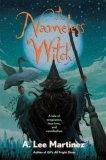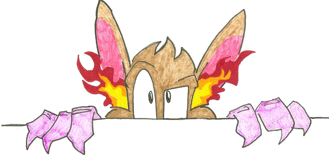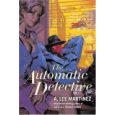Interview with A. Lee Martinez
by Kyle White
Like the mythical creatures that inhabit his fantasy novels, Texas author A. Lee Martinez shrouds himself in mystery. Few have seen his face and lived to tell about it. With the stealth of a super ninja, he swoops in, publishes his books, and disappears as fans devour his highly unusual tales.
In reality, Martinez is the author of four, well-received titles; however, he doesn’t feel the necessity to include an author photograph on his book covers. Encouraged to provide a picture for this interview, he instead offered a cartoon that he drew.
His debut title, Gil’s All-Fright Diner, earned a starred review in Publisher’s Weekly, and won the “Alex Award” given by the American Library Association. The book was optioned by New Line Cinema and many reviewers encouraged Martinez to write a sequel. A true independent, he ignored their prodding. He feels never-ending series have had a detrimental effect on the publishing industry.
He soon followed with In the Company of Ogres and A Nameless Witch, both of which received good reviews and sold well. His most recent work, The Automatic Detective, was released in February by TOR. It, too, received a starred review in Publisher’s Weekly.
Visit his lively blog at www.aleemartinez.com.
Kyle White: You’ve been credited with taking standard speculative fiction elements (such as vampires) and tweaking them to offer a new take on an old subject (i.e. the vampire is a redneck with a bad comb over). Do you research heavily, or does the ‘newness’ just come easily for you?
A. Lee Martinez: I don’t think it’s difficult to come up with something new. Fantasy and sci-fi have as many clichés as any other genre, and if you break one or two of those clichés, you end up with something new.
When I wrote Gil’s All-Fright Diner, I wasn’t sure I wanted to do it, because I’m not a fan of vampires in general. But then I thought of this vamp that wasn’t smooth or sophisticated, just a regular Joe. Turns out that there are many examples of everyday vampires in fantasy fiction. It’s just a relatively small percentage compared to the more recognizable brand of vampire.
In every story, I try to tweak a convention here or there, zig where most fantasy writers zag. I’d like to give myself credit for being amazing, but it’s just looking at what has been done a thousand times before and trying not to do it.
For you, what is the attraction of speculative fiction versus other genres?
I love the unlimited nature of the genre. I can write anything that springs to mind, create all kinds of worlds and characters. My first novel stars vampires, werewolves, ghosts, and ghouls. But my second was about orcs, goblins, and demons. My recent book is all about robots and ray guns.
I feel energized when beginning a new novel because I’m starting fresh with worlds of possibilities. If I were writing Westerns, I’d be stuck with certain tropes. While there are many fine stories in the Western genre (and I’m sure many more still to be told) I just couldn’t limit myself like that.
It’s also why I haven’t started writing series novels yet. Fantasy just offers too many possibilities for me to be happy writing only one sub-category.
Reviewers have described your style as narrative movies. What do you consider the biggest influences on your writing?
I’d say the single biggest influence on my writing has to be comic books. Even before I decided to try writing, I was a big comic book reader. I did read books too, but for the most part, my fantasy, science fiction, and storytelling technique is built on comic book foundations.
I have been told I have a visual style of storytelling. I also love the “anything goes” style of traditional superhero comics. There are no limits in a conventional comic book universe. Everything and anything is possible. And that’s what I love about writing fantasy and sci-fi adventure.
I suppose the second biggest influence would be cartoons. Particularly Disney’s Duck Tales, Darkwing Duck, and the like. I suppose it might weaken some of my artistic credibility to admit that, but these shows taught me the basics of good adventure storytelling. They created a solid foundation for my theories on writing, and I’ll stand by that.
Do you recommend aspiring writers of speculative fiction to find inspiration in comic books?
Right now, I would say comic books are largely a waste of time. There’s a drought of good, fun storytelling in comics at this point. Marvel and DC comics, the two big publishers, are publishing far more lousy titles than anything else. The smaller publishers have some interesting titles, but it’s bleak out there right now. I used to buy 20 titles a week, but now, I’m lucky if I can find three or four worth reading.
In other interviews, you’ve been described as a horror-comedy writer, but I’ve heard you dislike that title. How do you describe your writing style?
I don’t know. I’m not a big fan of categorization. I guess I consider myself a writer in the pulp tradition since my goal is to spin an entertaining story first and foremost. I’m not trying to impress anyone with my vocabulary, or my ability to describe a tree in poetic detail.
I just don’t know. I think it’s a mistake to try to summarize something as complex as a writing style into a handful of words. I write what I want to read and leave the categorization to other people.
Are you a plotter or a pantser? Do you outline or just write as inspiration hits?
I don’t plot in advance, and I’m not a big planner. It depends on the story, but I usually start with a character or a concept and see where it goes. I meet many aspiring writers who think they can’t write because they have to know everything in advance. For me, writing is an act of discovery. I figure if I’m surprised by the direction the story takes, then the reader will be surprised, too.

|
I’ve read all four of your novels and enjoyed each one for different reasons; however, my favorite was A Nameless Witch. The characters in that book truly lived for me. How do you create such believable characters?
I wish I could give you a magical secret, but it just comes down to treating the characters as characters. I think if I, as the writer, don’t push myself on the characters then they will be real. I don’t write character profiles, for instance. I just start with a basic idea and get to know the characters the same way the reader does, one page at a time. It’s as complicated and as simple as that.
Regarding believable characters, you are frequently asked to speak on the subject at conferences. What resources do you recommend new writers use to enhance their own characterization?
Good question. Wish I had a good answer. I learned to write by writing, so I didn’t do a lot of research, or read many books on writing. I just wrote and wrote a lot, analyzing what I thought worked and what didn’t. It helps when you have an honest critique group to steer you in the right direction, but in the end, I believe learning to write, characters included, is all about writing as much as you can and constantly striving to improve.
All four of your novels have a different tone. Gil’s was laugh-out-loud funny, Ogres a little dark, Nameless a love story, and Detective very crime noir. Why do you strive to create original stories with each new title, versus offering readers sequels of established characters?
It’s just part of my desire to stretch myself as a writer. I think too many writers limit themselves to a single “voice” and it really hurts their development. I want to push limits and explore, to hopefully learn something new from every book I write so that my next book will be even better.
Also, it helps to keep me from being bored by what I’m writing. I believe that a writer’s enthusiasm, more than any other element, is essential to telling a good story. If I’m bored, then how can I be surprised if the reader is bored, too?
I also believe that the audience wants to be surprised. We’ve been conditioned to desire familiarity, but I think there’s nothing as exciting as opening a book and not knowing what to expect. As long as the story is good.
Both Gil’s and Ogres have been optioned for the movies. Any status on their progress?
Gil’s has been placed with a studio and is in development, but it’s still at the preliminary stages. Ogres has just barely been optioned, so I have no clue where it’s going at this stage.
All of your books have an author bio but no photograph. I’ve heard you enjoy being mysterious. What gives?
It was an accident at first. I sent a photo, but it was lost somewhere along the way. Then I decided I didn’t care. I think it’s odd that people want to see photos of authors. We’re not movie stars. What I look like should be irrelevant.

|
The truth is that I’m a boring guy, and by not talking too much about my background and not having a lot of photographs floating around makes people think I’m much cooler than I am.
I’ve read you sold your first book to an editor who spoke at the writer’s critique group you attend. Tell me that story.
Actually, my editor didn’t speak at my group, but he did contact me through the group. He met a few workshop members at different conferences and asked to look at one of my novels. I sent him Gil’s All-Fright Diner and, long story short, it led to my first publication.
I’ve also heard that you didn’t meet your current editor face-to-face until the 2007 Fencon, yet the two of you had worked together on (I think) three books. Tell me about your first meeting, and how you managed the relationship through just phone calls and emails.
It’s not hard to have a workable author-editor relationship without ever meeting face-to-face. I write the novel by myself. He edits it, offers notes. I do some rewrites and send it back. Neither of our jobs requires us to be in constant contact. The few detailed exchanges we need to have can be handled by a phone call.
The first meeting was fun. It was nice to finally put a face to the voice. I’ll be honest and say it was probably more surprising for my editor than me, because on the phone, I’m all business, but I make a lot of jokes in person. So my editor was somewhat surprised by my personality, even a little put off by it in the beginning. Once he was used to it though everything was cool. At least, I hope it was.
You have a large fan base in Europe, especially Germany. What in your work do you feel earns you such devoted foreign readers?
I’d like to take credit, but I think it’s just the nature of the world now. The information age has made our planet more connected than ever, and cultures are intermingled. On the other hand, I do think that foreign readers aren’t so quick to dismiss my novels as “fluff” simply because they have humor elements. But there’s also dumb luck, and perhaps I just got lucky with Europe. So much of this business depends on luck, and the right exposure at the right time can make all the difference in any market.
The fans on your blog seem very dedicated, and you’re responsive to their questions. In today’s environment where readership is dwindling what do you think are the best ways for an author to build his audience?
Write good stories, entertaining and worth reading. Readership dwindles because books are being written with certain assumptions of what readers are going for. Some of those assumptions are true, but it’s still limiting.
I want to reach out and grab new readers, people who don’t necessarily read a lot now, and may not even know they like to read. The ones who are just waiting to discover a good, entertaining story told well enough to hold their attention.
When I talked about the bad comic book stories I keep reading, a big reason of why they’re bad is that they’re being written for comic book fans. The comic book world is going through a crisis as the audience continues to dwindle. Instead of trying to attract new fans, they cling to their established fan base. But you have to grow to be successful.
I also wish the dominance of series (particularly in fantasy and sci-fi) would come to an end. I don’t read much modern fantasy, because it demands that you dedicate yourself to six or seven books to read a single story. That’s a big commitment. Compare that to most movies, where you get an entire story in two or three hours.
If you check out most sci-fi novels from the 50’s and 60’s, they’re much shorter than current novels and usually self-contained. So I’d like that trend to make a comeback, though I know that’s just wishful thinking on my part.

|
Tell me about your newest book, The Automatic Detective. What inspired it?
I wanted to write a robot story. I’ve always liked robots. Transformers were my favorite toys as a kid. I also love retro sci-fi, the type featured in classic “weird science” magazines. The final element was old crime noir novels. I combined all three and Detective evolved from that.
I also wanted to write a robot story where the robots aren’t obsessed with either being human or destroying humans. I think it’s a very egocentric view of ourselves to think that an intelligent machine would automatically want to be like us.
Detective was released in February. What’s next for A. Lee Martinez? What are you working on today?
In September 2008, I have Too Many Curses, my next novel, coming out. It’s a fantasy novel about a small dog-like housekeeper who finds herself in charge of a castle of cursed inhabitants. I was inspired to write it because I loved the idea of this unassuming, seemingly unthreatening heroine who saves the day through her wits, level head, and organizational skills.
Right now I’m working on Divine Misfortunes. It’s a story about an alternate modern-day world where mythology is history and the gods are real. Religion is more of a business arrangement, and our protagonists sign up with a god of good fortune. They end up in the middle of a holy war and a complicated crisis of mortal and immortal love lives. I’m a third of the way through it and am very happy with it so far.
Any final words for aspiring speculative fiction writers?
Write. Write a lot. Keep writing and then realize that you probably aren’t writing enough.
Submit. Expect rejection, but keep submitting no matter what.
Get some support if you can. Go to writing conferences, or join a critique group. But realize that all critique groups aren’t the same. Different groups offer different benefits. Many groups are there to encourage and give aspiring writers a pat on the back. They work fine in that regard, even if they don’t help in any other way. Writing is a lonely profession, and any encouragement can be invaluable.
My group, the DFW Writers’ Workshop, is really one in a million. It’s a very special group. Not only does it offer encouragement, but it improved my writing. It allowed me to get used to presenting my work and talking about it.
Copyright © 2008 by Kyle White and A. Lee Martinez
